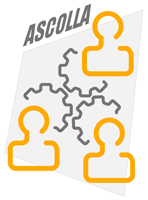This is the preliminary schedule for the workshop. Please check back closer to the workshop for any last-minute changes.
Please see the proceedings' page if you would like to download the papers themselves.
| 09:30 - 09:45 |
Welcome & Introduction |
| 09:45 - 10:45 |
Collaboration in a Changing 21st Century Context (Invited Talk)Abstract » Ever since Kurt Lewin over 60 years ago began to scientifically study groups, group characteristics have generally been treated as stable. However, groups instead should be viewed as dynamic and situational. I will highlight how the use of Information and Communication Technology (ICT) is changing the way that groups form, organize, and conduct work. I will draw on my research in distributed collaboration to illustrate how ICT is changing the notion of group scalability, sociability, membership, dynamics, coordination, mobility, and interaction. I will discuss challenges in supporting groups as collaboration becomes more commonplace on a global scale.
|
| 10:45 - 11:00 |
Discussion |
| 11:00 - 11:30 |
Coffee break |
| 11:30 - 12:00 |
An Activity Awareness Visualization Approach Supporting Context Resumption in Collaboration EnvironmentsAbstract » In the research on Computer Supported Cooperative Work, activity awareness is considered a key feature for the coordination of users’ activities. We propose a model for the visualization of recent activity awareness information organized at two abstraction levels: (a) the upper level, represented as a tag cloud, provides a general view of the degree of activity occurred in the user’s collaborations. (b) the lower level is a detailed view of the occurred events, structured on the basis of the user’s activity contexts. The results of a user study show that the adoption of the proposed solution is preferable over a standard awareness space providing a direct access to complete awareness information.
|
| 12:00 - 12:30 |
Team Formation for Research Innovation: The BRAIN ApproachAbstract » Recently trends show that innovative research requires multidisciplinary teams. This brings forth the importance of team formation for innovation. In order to successfully identify who has to be in a specific team and what constitutes potentially successful multidisciplinary team collaboration, social processes important for team formation for innovation have to be understood. Based on this, technological approaches that can support these processes can be defined. This paper outlines key processes regarding team formation for innovation, following psychology and social sciences literature. We then present the BRAIN approach on forming multidisciplinary teams for innovation, which addresses some of the aspects identified in the literature. The paper revisits the current state of the BRAIN application, and recommends future work where user modelling, adaptation and personalisation approaches can be used to address the limitations identified.
|
| 12:30 - 13:00 |
Scaffolding Collaborative Learning Opportunities: Integrating Microworld Use and ArgumentationAbstract » This paper presents our research efforts to support students’ collaborative process when learning mathematics and science as they interact in microworlds and engage in discussions and structured arguments. From a pedagogical perspective, the system provides students with an environment to explore challenging problems and encourages them to collaborate. The collaboration takes place in a discussion environment that is integrated with microworlds, allowing students to discuss and argue with one another and share their rationales and insights. The challenge of this work lies in providing students, teachers, and researchers with coherent, unified feedback within the system as a whole. To accomplish this, the system must combine and analyze student actions across tools, and results of those actions. We conclude that the integration of these two types of software tools provides a solid foundation for intelligent analysis of student collaboration.
|
| 13:00 - 15:00 |
Lunch break |
| 15:00 - 15:30 |
Augmented Collaborative Spaces for Collective Sense Making: The Dicode ApproachAbstract » Sense making is at the heart of cognitively complex and data intensive decision making processes. It is often conducted in collective spaces through exchange of ideas, discussions, analysing situations, and exploring alternatives. This position paper proposes a novel approach to facilitate collective sense making via a collaboration platform which (a) offers multiple views to collaboration (including forums, mind maps, and argumentation structure), and (b) provides intelligent support to understand sense making behaviour by employing user and community modelling techniques. The work is conducted in the framework of the EU funded Dicode project, developing intelligent services for data-intensive collaboration and decision making.
|
| 15:30 - 15:45 |
Designing Tabletop-Based Systems for User Modelling of CollaborationAbstract » Tabletops offer a new form of interaction and create new possibilities for small groups of people to collaborate and discuss tasks aided by the shared use of digital materials and tools. The collaborative affordances of tabletops make them suitable for many uses in public spaces as well as in more restricted environments such as workplaces and learning settings. This creates new opportunities for improving collaboration, particularly by capturing data that can be used to model the nature of the interactions and to present this model to the users in a form that will facilitate improved collaboration. It is timely to establish principles for designing tabletop-based systems in a manner that can facilitate such modelling. These principles should support effective use of data mining tools to create group collaboration models. In this paper, we outline theoretical design principles based on a careful analysis of the nature of tabletop datasets and collaboration.
|
| 15:45 - 16:45 |
Discussion Panel |



